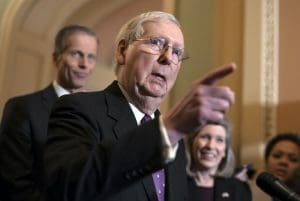McConnell still working on packing the courts as nation focuses on coronavirus
Senate Majority Leader Mitch McConnell has other priorities as he drags his feet on approving a plan to address the coronavirus pandemic.

Senate Majority Leader Mitch McConnell gave the Senate a long weekend despite the ongoing coronavirus pandemic, but he is still laser-focused on packing the courts with far-right judges.
McConnell is currently engaged in a “continuing lobbying effort” urging judges appointed by past Republican presidents to retire soon so Donald Trump can nominate their replacements, the New York Times reported on Monday.
McConnell and conservative allies are reminding judges that if Trump loses in November, it could be eight years before another Republican sits in the White House.
The new report arrives just a few days after McConnell left Washington, D.C., without addressing an emergency bill passed by the House to help Americans deal with the fallout from the coronavirus outbreak.
The House passed the bill by an overwhelming 363-40 majority, but the legislation cannot move forward until McConnell decides to return to Congress.
While he won’t rush to help Americans deal with a health pandemic, McConnell has been an outspoken supporter of packing the courts with conservative justices, even if justices who are notably unqualified or have a history of discriminatory remarks.
McConnell even changed Senate norms and traditions in order to ram through judges to fill vacancies more quickly. For instance, McConnell reduced the amount of time the Senate is allowed to debate judges from 30 hours to just 2 hours.
In just 2019, the McConnell-led Senate confirmed three judges rated “not qualified” by the American Bar Association. For comparison, former President Barack Obama never appointed a single judge with an unqualified rating.
In March 2019, the Senate confirmed 36-year-old Allison Rushing to the Fourth Circuit Court of Appeals. Rushing has written that heterosexual marriage is more moral than LGBTQ marriage, and once interned at the Alliance Defending Freedom, which had been labeled a hate group by the Southern Poverty Law Center.
In total, Trump has nominated, and the Senate has confirmed, 51 judges to the nation’s appeals courts, meaning Trump-appointed judges now make up a quarter of appeals court judges.
A New York Times investigation found these judges are younger, less diverse, and more likely to be publicly engaged in conservative causes than judges appointed by Presidents Obama and Bush.
In January, when Trump appointed his 50th appellate court judge, the National Women’s Law Center found that 78% of Trump’s nominees were male and 86% were white. None were black.
“When the roster of judges who are opining on these cases are not representative of the populations most impacted by these decisions, it’s a problem,” Theresa Lau, senior counsel for NWLC, wrote in January.
“When judges lack understanding of the real-life implications of their rulings, it’s a problem. When the courts are stacked with young conservative ideologues who are putting their personal biases over their duties to uphold the law and rolling back progress for decades to come, it’s a problem,” Lau said.
McConnell’s effort to push GOP-appointed judges to resign did not sit well with his Democratic counterpart.
“Senator McConnell knows he can’t achieve any of his extreme goals legislatively, so he continues to attempt to pull America to the far right by packing the courts,” Senate Minority Leader Chuck Schumer told the Times in a statement.
Schumer added that McConnell’s emphasis on the courts may “significantly hurt Republican senators in November.”
Republicans currently hold a slim 53-47 majority in the Senate. After Democrats regained control of the House in the 2018 election, Schumer is hoping that Democrats can win at least three or four seats in November to regain control of the upper chamber.
While McConnell stays focused on the courts, the Times reports nearly 4,000 confirmed coronavirus cases in the United States and at least 68 people have died.
Published with permission of The American Independent Foundation.
Recommended

Biden campaign launches new ad focused on Affordable Care Act
Former President Trump has said he wants to do away with the popular health care law.
By Kim Lyons, Pennsylvania Capital-Star - May 08, 2024
Ohio doctors fear effects of emergency abortion care case set to go before U.S. Supreme Court
A federal law that allows emergency departments to treat patients without regard to their ability to pay will be under U.S. Supreme Court scrutiny this week, and Ohio doctors are concerned about the case’s local impact on emergency abortion care.
By Susan Tebben, Ohio Capital Journal - April 23, 2024
House GOP votes to end flu, whooping cough vaccine rules for foster and adoptive families
A bill to eliminate flu and whooping cough vaccine requirements for adoptive and foster families caring for babies and medically fragile kids is heading to the governor’s desk.
By Anita Wadhwani, Tennessee Lookout - March 26, 2024









































































